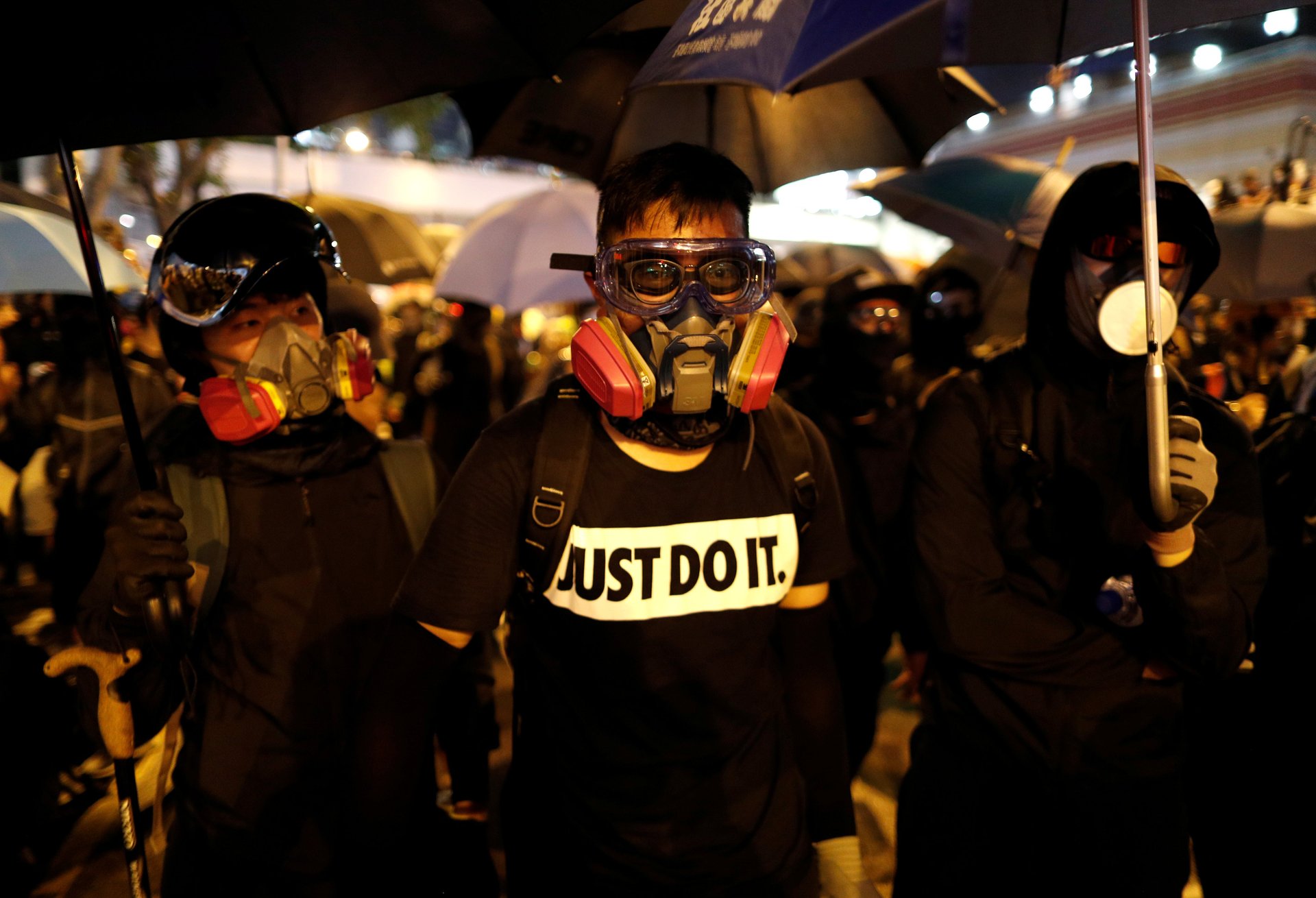Hong Kong will use emergency powers to stop protesters from wearing face masks
Hong Kong will ban face masks at public gatherings by invoking emergency laws, according to multiple local media reports, in an attempt to quell protests that have continued for over four months.


Hong Kong will ban face masks at public gatherings by invoking emergency laws, according to multiple local media reports, in an attempt to quell protests that have continued for over four months.
The government could impose the ban as soon as tomorrow (Oct. 4) by invoking the Emergency Regulations Ordinance, a colonial-era legislation that dates back to 1922, according to reports. Chief executive Carrie Lam will hold a special meeting with the Executive Council, her cabinet, to enact the ban, according to reports. The ordinance was last used to put down violent riots in 1967.
If emergency laws are invoked, it would give the government sweeping powers to “make any regulations whatsoever” that it considers to be in the “public interest” in the face of “an occasion of emergency or public danger.” Measures the government would be empowered to take include shutting down communication networks, censoring publications, entering and searching premises without warrants, taking control and possession of any property, and greater leeway for arrests, detention, and deportation. However, the government is only proposing a limited use of the emergency law to stop people wearing masks at protests, according to a source cited by the Wall Street Journal (paywall).
The benchmark Hang Seng Index briefly spiked in reaction to the news, reversing an earlier decline.
Such a ban would come just days after police shot an 18-year-old student protester with a live round at close range in the chest on Tuesday (Oct. 1), narrowly missing his heart and spine. That day, coinciding with China’s 70th National Day, was also one of the most chaotic and violent yet since protests started in early June in opposition to a now-withdrawn extradition bill.
Speaking at a press conference this afternoon, lawyers Eric Cheung and Chris Ng urged the government not to use emergency powers to impose a face mask ban, arguing that such a move would be unlikely to withstand a legal challenge and that it would set a dangerous precedent and scare off investors. They added that the ban would do little to deter protesters, as they have been violating laws already. In a statement, the Civil Human Rights Front, which has organized several recent mass marches, criticized the government’s decision to invoke what it called the “evil” colonial-era emergency law, saying it would be the end of the “One Country, Two Systems” model that gives Hong Kong autonomy from mainland China.
Lam has been under pressure in recent weeks to take more heavy-handed measures to put an end to the anti-government protests. When asked in late August whether she would consider using emergency laws, she said the government “has the responsibility” to examine “all of Hong Kong’s laws, if they can provide a rule of law measure to stop violence and chaos.”
Proponents of the face mask ban also point to France as an example of another jurisdiction that has taken similar measures, as the French government banned masks earlier this year to quell the Yellow Vest protests.
As of now, it’s unclear whether the face mask ban would similarly apply to journalists covering the protests. Yesterday (Oct. 2), one officer was captured on video forcibly removing the respirator mask of a local journalist, marking another incident of aggressive behaviour from the police against members of the press.
Protesters have been increasingly angry at the seeming impunity with which the police have been carrying out their actions. Since early on in the protests, police officers have refused to display their warrant cards or wear numbers on their gear, making them hard to identify if citizens want to make a complaint. Many officers have also taken to adding a strip of reflective foil to their helmet visors, rendering them entirely unrecognizable.
On local online forum LIHKG, used by protesters as a de facto command center, some commented that the ban could be useful in identifying masked undercover police officers, who have made violent arrests and fired warning shots in crowds in recent weeks. Others welcomed the enactment of the law, as the move aligns with protesters’ “If we burn, you burn with us” creed—that only the specter of widespread damage to Hong Kong’s reputation will stave off more aggressive measures by Beijing to intervene in the city’s affairs.